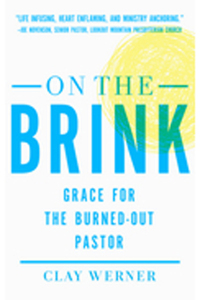As I read On the Brink: Grace for Burned Out Pastors I felt Clay’s understanding arm wrapped around my shoulder, h is words carrying heartfelt empathy, something that can be hard for pastors to find. As I collapsed on my bed in the mountains, I read and silently wept. My Heavenly Father was tenderly pulling the pain out.
is words carrying heartfelt empathy, something that can be hard for pastors to find. As I collapsed on my bed in the mountains, I read and silently wept. My Heavenly Father was tenderly pulling the pain out.
I’ve peered over the fence of burnout a couple times. The first time was due to a mix of traveling too much, demands of ministry, and not enough intimacy with Christ. The second time I saw into the land of waylaid pastors from the vantage point of suffering. From either direction, I’ve found the Lord to be a great Comforter and Instructor. Both are necessary. If we receive only comfort, we will simply withdraw. If we only receive instruction, we with wither away on the vine.
I have organized some insights from this book under four important headings: Empathy, Idolatry, Suffering, & Hope.
EMPATHY IN THE DIFFICULTY OF MINISTRY
It doesn’t take long, after experiencing a major storm in leadership, of you to being to wonder if you need to and on ship. Whether it’s a seventy foot waves or just an extremely slow lead in the nice weather, there are times when walking way form the community to which God has called you to minister seems to be safer than staying put.
It is rare that all these things happen at once, but any pastor can attest that there are periods in ministry when one thing comes right after the next, leaving him exhausted and needing significant rest and renewal. Yet such rest is rare when a leader has to create yet another sermon for Sunday and get ready for yet another committee meeting…and still have time to be with and minister to his own family.
IDOLATRY IN OUR SUFFERING
Here is the danger of every pastor, church planter, and even church member: “The church we want becomes the enemy of the church we have.”
“If we demand, in any of our relationships, either perfection or nothing, we will get nothing.”
“He made a point that changed my life and left me in tears. He said that too often pastors only see areas of deficiency in their people and not evidences of grace, and therefore they become bitter and joyless…Maybe the church as we have it provides the very conditions and proper company congenial for growing up in Christ for becoming mature, for arrive at the measure of the stature of Christ. Maybe God knows what he is doing, giving us church, this church.”
HOW TO SUFFER WELL
Werner freely admits that the joy that should come from knowing Christ and being saved by him, trusting in his good promises in the midst of trials, doesnt require a cheerfulness “as to remove all feeling of bitterness and pain.”
It is necessary and essential for patient endurance in ministry, that the “bitterness of the cross be tempered by spiritual joy.”
“Patience is not about waiting for the doctor or for the cars to move in the drive-through so I can finally gey my long-awaited double cheeseburger. Patience is perseverance under provocation.”
“With whatever you have gone through or are going through, is your heart filled with compassion, humility, and meekness?”
“Are your interactions with fellow sinners marked by kindness, patience, and forgiveness? If we let these questions penetrate deep enough, we’ll find that stew need grace just as much as, if not more than, the people we are pointing our fingers at.”
HOPE FOR THE PASTOR (and everyone else)
“A vital walk with Christ is the first priority.”
Don’t just prepare meals for others; feast for yourself.
“When I couldn’t or didn’t want to pray anymore, I took a measure of comfort in the biblical claim that if all this was really true, the Spirit was interceding within me and for me with groans too deep for words.”
The resurrection, then, is good news for pastors who are exhausted and crushed by life, ministry, and their own sins. It means the resurrected Shepherd of the sheep will find you to strengthen you once again with his resurrection power (Isa. 40:11, 27-31). The King of life will breathe life into you once again by the Spirit and grant you new repentance, strengthened faith, and a refreshed heart.”
“It is the repentant heart that has the most room for the rivers of living water flowing from the heart of our King.”
“There is a deeper joy that can’t be touched by circumstances.
“If God can raise Jesus from the dead, he is powerful enough to pour life back into a hardened and cold heart.”
Clay’s book is just $7 at WTS Books right now.
